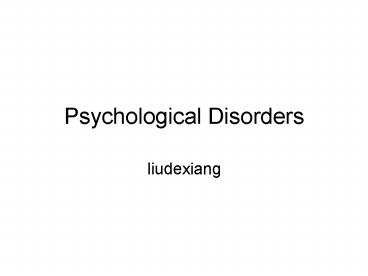Psychological Disorders - PowerPoint PPT Presentation
1 / 33
Title:
Psychological Disorders
Description:
Psychological Disorders liudexiang Overview Perspectives on psychologcal disorders Mood disorders Anxiety disorders Psychosomatic and somatoform disorders ... – PowerPoint PPT presentation
Number of Views:227
Avg rating:3.0/5.0
Title: Psychological Disorders
1
Psychological Disorders
- liudexiang
2
Overview
- Perspectives on psychologcal disorders
- Mood disorders
- Anxiety disorders
- Psychosomatic and somatoform disorders
- Dissociative disorders
3
Perspectives on psychologcal disorders
- Biological model
- Psychoanalytic model
- Cognitive-behavioral model
- Diathesis-stress model
- Systems approach
4
Biological model
- Biological model View that psychological
disorders have a biochemical or physiological
basis.
5
Psychoanalytic model
- Psychoanalytic model View that pscychological
disorders result from unconscious internal
conflicts.
6
Cognitive-behavioral model
- Cognitive-behavioral model View that
psychological disorders result from learning
maladaptive ways of thinking and behaving.
7
Diathesis-stress model
- Diathesis-stress model View that people
biologically predisposed to a mental disorder
will tend to exhibit that disorder when
particularly affected by stress.
8
System approach
- System approach View that biological,
psychological, and social risk factors combining
to produce psychological disorders. Also known as
the biopsychosocial model of psychological
disorders.
9
Mood disorders
- Depression
- Suicide
- Mania and bipolar disorder
10
Mood disorders
- Mood disorders Disturbance in mood or prolonged
emotional state. - Depression A mood disorder characterized by
overwhelming feelings of sadness, lack of
interest in activities, and perhaps excessive
guilt or feelings of worthlessness.
11
Mood disorders
- Mania A mood disorder characterized by euphoric
states, extreme physical activity, excessive
talkativeness, distractedness, and sometimes
grandiosity.
12
Mood disorder
- Biopolar disorder A mood disorder in which
periods of mania and depression alternate,
sometimes with periods of normal mood
intervening.
13
Anxiety disorders
- Anxiety disorders Disorders in which anxiety is
a characteristic feature or the avoidance of
anxiety seems to motivate abnormal behavior.
14
Specific phobia
- Specific phobia Anxiety disorder characterized
by an intense, paralyzing fear of something.
15
Agoraphobia
- An anxiety disorder that involves multiple,
intense fears of crowds, public places, and other
situations that require separation from a souce
of security such as the home.
16
Panic disorder
- An anxiety disorder characterized by recurrent
panic attacks in which the person suddenly
experiences intense fear or terror without any
reasonable cause.
17
Generalized anxiety disorder
- An anxiety disorder characterized by prolonged
vague but intense fears that are not attached to
any particular object or circumstance.
18
Obsessive-compulsive disorder (OCD)
- An anxiety disorder in which a person feels
driven to think disturbing thoughts or to
perform senseless rituals.
19
Pcychosomatic disorders
- Disorders in which there is real physical illness
that is largely caused by psychological factors
such as stress and anxiety.
20
Somatoform disorders
- Disorders in which there is an apparent physical
illness for which there is no organic basis.
21
Conversion disorders
- Somatoform disorders in which a dramatic specific
disability has no physical cause but instead
seems related to psychological problems.
22
Dissociative disorders
- Disorders in which some aspect of the personality
seems separated from the rest.
23
Dissociative identity disorder
- Also called multiple personality disorder which
is characterized by the separation of the
personality into two or more distinct
personalities.
24
Depersonalization disorder
- A dissociative disorder whose essential feature
is that the person suddenly feels changed or
different in a strange way.
25
Personality disorders
- Disorders in which inflexible and maladptive ways
of thinking and behaving learned early in life
cause distress to the person or conflicts with
others.
26
Schizoid personaltiy disorder
- Personality disorder in which a person is
withdrawn and lacks feelings for others.
27
Paranoid personality disorder
- Personality disorder in which the person is
inappropriately suspicious and mistrustful of
others.
28
Dependent personaltiy disorder
- Personality disorder in which the person is
unable to make choices and decisions
independently and cannot tolerate being alone.
29
Avoidant personality disorder
- Personality disorder in which the persons fears
of rejection by others lead to social isolation.
30
Narcissistic personality disorder
- Personality disorder in which the person has an
exaggerated sense of self-importance and needs
constant admiration.
31
Borderline personality disorder
- Personality disorder characterized by marked
instability in self-image, mood, and
interpersonal relationships.
32
Antisocial personality disorder
- Personality disorder that involves a pattern of
violent, criminal, or unethical and exploitative
behavior and an inability to feel affection for
others.
33
The End































